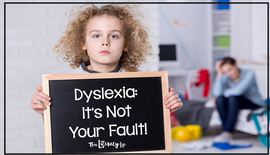Sehrish Khan
Dyslexia is a widespread but frequently misunderstood learning difficulty that affects millions of people around the world, making everyday tasks like reading and writing a constant struggle. Despite its prevalence, there is still a lack of awareness about what it truly is and how to effectively support individuals who experience it.
Dyslexia is a learning difficulty that mainly impacts a person’s ability to read, write, spell, and occasionally speak. It is not linked to intelligence, eyesight, or educational background.Individuals with dyslexia often have normal intelligence and motivation, but they face challenges in decoding words, quickly recognizing written text, and comprehension.
Early signs of dyslexia often become evident in childhood, especially when a child starts learning to read. Children may struggle to recognize letter sounds, mix up letters that look alikesuch as “b” and “d”, and face difficulty in spelling basic words. They may read at a slower pace than their classmates and sometimes avoid reading aloud altogether. These challenges are not due to laziness or lack of intelligence, but rather the way their brain interprets and processes written language.
Dyslexia is considered a neurological condition and often has a genetic component, as it tends to run in families. Research using brain imaging has shown that people with dyslexia activate different areas of the brain during reading compared to those without the condition. Unfortunately, misconceptions still exist, some believe dyslexia is caused by poor teaching, lack of effort, or low intelligence, which is entirely untrue. In fact, many individuals with dyslexia are exceptionally intelligent, creative, and capable.
Dyslexia can have a major effect on a student’s academic progress, especially in subjects that require strong reading skills. Without appropriate support, children may struggle to keep up in class, leading to low self-esteem and anxiety about learning. If left undiagnosed, dyslexia can continue to create difficulties in adulthood, affecting job performance, communication abilities, and time management. Fortunately, with the right strategies and support, individuals with dyslexia can overcome these challenges and succeed in both education and professional life.
Helping individuals with dyslexia starts with early identification and a patientsupportive approach. Educators can adopt phonics-based and multisensory techniques that address various learning needs. Tools such as audiobooks and speech-to-text software can also greatly enhance learning and confidence. At home, parents play a vital role by fostering a positive atmosphere, focusing on progress rather than perfection, and encouraging their child to build self-belief and resilience.
Although global awareness about dyslexia is increasing, the condition remains largely overlooked in Pakistan. In many classrooms, children with dyslexia are wrongly labeled as inattentive, weak in English, or academically slow. This is often due to a lack of teacher training in recognizing learning disorders. Access to professional diagnosis and support is limited, particularly outside major urban centers. As a result, countless students continue to struggle in silence, without the understanding or assistance they need. Comprehensive awareness initiatives, educator training, and accessible psychological services are still urgently needed across both public and private education systems.
Students with dyslexia often experience repeated academic setbacks, leading to embarrassment in the classroom and a decline in self-confidence. Many feel isolated or become targets of teasing for reading slowly or making frequent spelling mistakes. Over time, these struggles can result in anxiety, emotional withdrawal, or a complete disengagement from learning. For parents, the situation is equally distressing. In the absence of proper understanding, they may resort to extra tutoring or discipline, unaware that their child is grappling with a legitimate learning disorder. In a society, where academic success is deeply tied to self-worth and social expectations, this lack of awareness only deepens the emotional toll on both students and their families.
Parents play a crucial role in the early identification and ongoing support of children with dyslexia. When a child consistently struggles with reading or writing, it should not be dismissed as laziness or lack of ability. Instead, parents should stay observant, communicate openly with teachers, and seek guidance from a child psychologist or educational expert. A nurturing home environment that values effort over perfection can significantly boost a child’s confidence. Simple practices like reading together, using phonics-based activities, and encouraging the child’s strengthswhether in creativity, problem-solving, or verbal skillscan help them feel capable, supported, and empowered.
Educational institutions and government authorities must take decisive action to address the challenges posed by dyslexia. Schools should offer specialized training for teachers to help them recognize and support students with learning difficulties. Early screening programs must be implemented, and access to educational psychologists particularly in public schoolsshould be prioritized. Curriculum development should reflect diverse learning needs, ensuring that teaching materials are inclusive and adaptable. Above all, school policies must move away from punitive approaches and instead foster understanding and support. Making inclusive education a national priority is not optional, it’s essential.
I recently attended an enlightening session on dyslexia organized by the Institute for Developmental Education & Advocacy for Special Needs (IDEAS) in Islamabad, led by Irum Mumtaz. The session shed light on the realities of dyslexia and the tireless advocacy behind it. Participants learned about the Dyslexia Bill 2022, which was successfully passed in the Senate and now awaits approval in provincial assemblies. Despite this legislative milestone, the initiative continues to face a lack of institutional support. The team at IDEAS, along with other advocates, are pushing forward largely through personal effort, highlighting both the urgency and the uphill battle involved in securing educational rights for children with dyslexia in Pakistan.
Dyslexia is not a flaw or a failure, it is simply a different way the brain processes language. With the right awareness, empathy, and teaching methods, children with dyslexia can not only catch up but truly excel. It’s time we dispel outdated myths and replace judgment with understanding. Building an inclusive education system means recognizing that intelligence comes in many forms and every child deserves a fair chance to succeed. In Pakistan, this journey must begin with open conversations, early interventions, and a national will to support children who learn differently. True progress lies in ensuring that no child is left behind simply because their mind works in its own remarkable way.

















